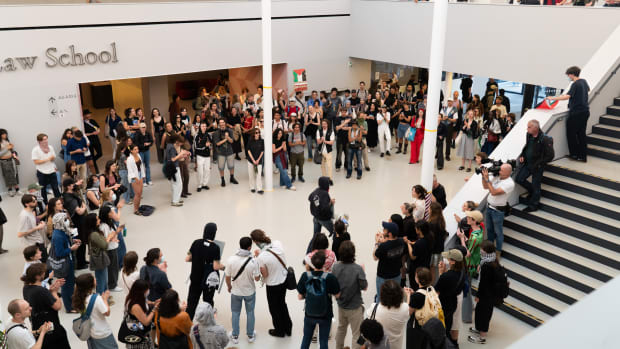
“An occupation is supposed to be disruptive”
Why should occupation be an impermissible means of action, researcher Erik van Ree wonders. “I hope the current grim situation will not lead to UvA staff and students becoming needlessly restricted in the forms of action and expression.”
The university Executive Board does not have it easy. Its imploring formulas about respectful treatment, building bridges, and safe environments have not helped, as evidenced by the shocking vandalism in occupied university buildings. For that matter, there are also images of a woman lying on the ground with three police officers bent over her, slapping her. Excessive police brutality (and worried-looking mayors who say it is not true) is timeless.
The university Board reacts on a day-to-day basis, but the guidelines it formulates for itself transcend the importance of what is currently taking place and will not simply be forgotten when this crisis is over. The guidelines developed concern both the permissibility of the means of action and the limits of permissible expression within the university community.

Legitimate
To begin with the first point, the Executive Board now takes the position that demonstrations are a legitimate means of action, but occupations, tents on the premises, and the like are not. Given the new destruction to be expected with new occupations, this position is pragmatically justifiable, but it is flawed as a principled position.
Why should occupation be an impermissible means of action, I wonder. A few days ago I heard from the mouth of the mayor of Leeuwarden, Van Haersma Buma, and from our own Halsema, that occupying buildings violates property rights. One occupies a building against the will of the owner. This is indeed the case, but mayors are well aware that every right has limits. The mere fact that an action violates a particular right is never a sufficient argument against it.
There is an impressive tradition of land and building occupations as a radical means of action, even in democratic states ruled by law. Occupation is a form of disruption and an intervention in the lives and work of people who have not asked for it. But this can never be a sufficient argument to ban it as a means of action.
After all, any physical means of action is disruptive. Even a neat, police-escorted, and announced demonstration hinders motorists. Any strike cripples a business. Yet democratic, constitutional states accept such actions.
Of course, the interests of the occupiers must be weighed against those of the users of the building they occupy. There comes a point when the occupation starts to weigh too heavily and a request for police intervention becomes reasonable. Occupations accompanied by intimidation, destruction, or violence are illegitimate from the start. But this misery should not become a reason to take occupations off the table as a means of action in the future.
Lumped together
The second, even more pressing issue concerns the limits of freedom of expression in colleges or during protests. Administrative communications call for respectful conversation without “offensive slogans” and “without violating the boundaries of the other.” This is a fatally undefined, useless directive. In fact, two types of hurt and boundary violations - one permissible the other impermissible - are lumped together here.
“Less, less, less” (reference to an earlier statement by politician Geert Wilders about Moroccans: editorial board) and the burning of the Quran are both undesirable, but while the former is, in my view, punishable, the latter definitely should not be. In the first case, individual people are targeted, in this case Moroccan Dutch; in the second, something that many of them hold sacred is being targeted - not them personally. The first case involves discrimination, the second involves excessive and primitive criticism of a (religious) ideology.
The conflict between Israel and Hamas/Palestine plays out on multiple dimensions simultaneously and is of unprecedented ferocity. To begin with, the warring parties accuse each other of war crimes and genocide. On top of that, theoretically or in practice, they deny each other’s right to exist as a state. Finally, they condemn each other’s ideological foundations - Zionism and Muslim Brotherhood philosophy, respectively - as criminal constructs.
The solution sought by the Board to prevent polarization between Palestinian and Israeli supporters at the UvA amounts, in consequence, to the banning here of the radical or extreme views that play such a decisive role there. Within the administration’s offensive logic, for example, Israel’s (or Palestine’s) right to exist as a state should not be questioned. Nor should Zionism and Islamic fundamentalism be portrayed as criminal. In both its Jewish and Palestinian versions, “From the river to the sea” falls outside the permissible order as too offensive.
Not a workable model
This does not seem like a workable model for managing polarization. People seek not only safety but also the freedom to express themselves. Blocking extreme voices inevitably generates anger and thus contributes to tensions. The issue also has a principled side. Judgments - even excessive and hurtful ones - about political projects, ideologies, states, and organizations should be allowed.
The limit lies where excessive political judgments turn into intimidation and discrimination against individuals, including attacks on Jews as Jews or on Muslims as Muslims, making individual Jews responsible for Israel’s policies, or individual Muslims or Palestinians for Hamas. The right to proclaim one’s own extreme opinion creates the obligation to allow every other opinion as well. Intimidating individuals for their views on the Israel-Palestine conflict - whatever that view may be - cannot be allowed.
This distinction between political opinion and individual intimidation and discrimination does not provide a wholly valid formula. Inevitably there is the gray zone in which we must find our way. Propaganda for Hamas, a political but also a terrorist organization, is unacceptable. Propaganda for driving Jews into the sea or for expelling Palestinians from Gaza may reflect a political concept, but it still cannot be allowed at the UvA, not only because of the intrinsically criminal nature of these views but also because they may be perceived as directly threatening by individual staff and students.
All this being said, it is to be hoped that the current grim situation will not result in UvA employees and students becoming needlessly restricted in the forms of action and expression available to them in the future.
Erik van Ree is guest researcher at the Faculty of Humanities and researches violent revolutionary organizations.

